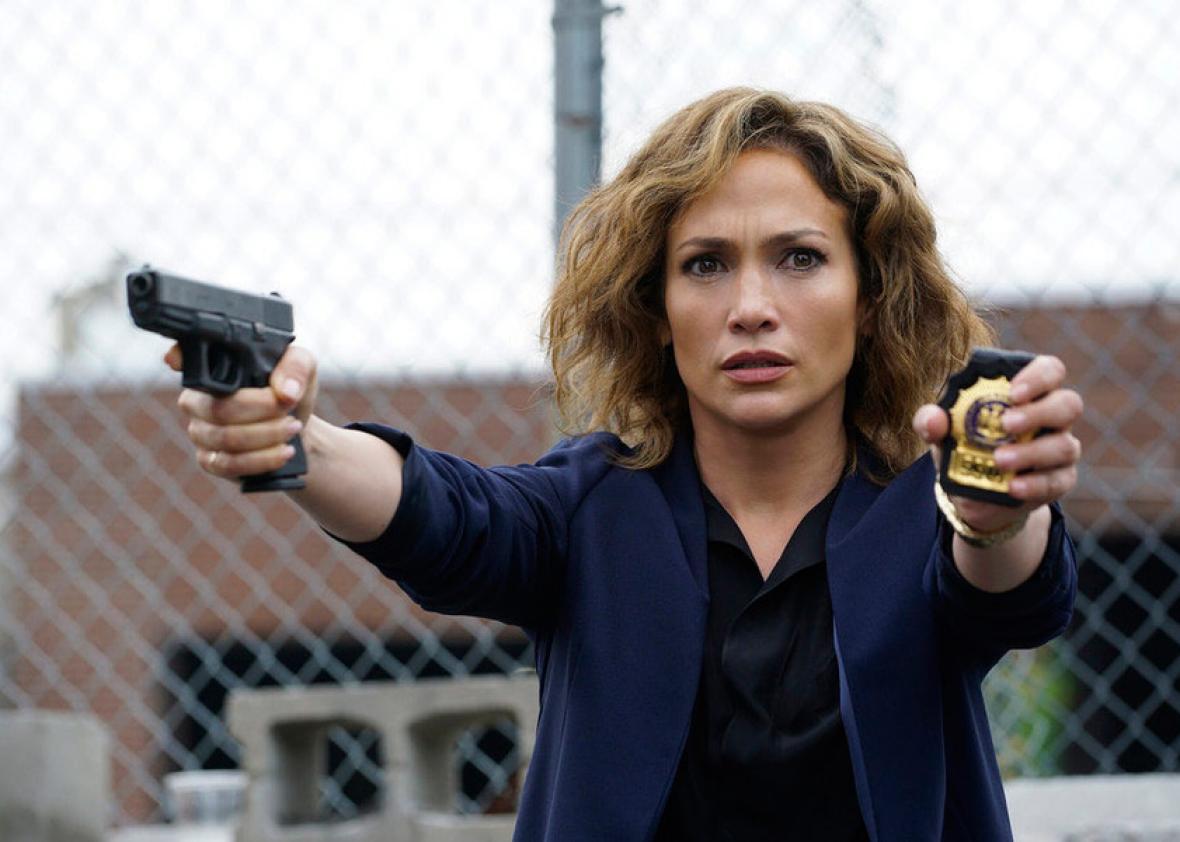Shades of Blue, a new cop drama starring Jennifer Lopez that premieres Thursday on NBC, has terrible timing. The show itself is only moderately terrible, another failed network attempt to make a gritty cable drama—in this case, The Shield by way of NBC. And it would be a just another mediocrity, an occasion to admire co-star Ray Liotta’s scenery chewing and Lopez’s haircut, which is somehow contemporary and yet full of ’80s authority, if a cop didn’t shoot and kill an unarmed black man in the opening minutes of the show.
Lopez stars as Harlee Santos, a detective and single mother, who is part of a crew of unabashedly corrupt cops operating out of a precinct in Brooklyn. Overseen by Matt Wozniak (Liotta), the crew, which also includes Drea de Matteo in an astonishingly thankless role, treats one another like family, while skimming protection money off businesses and criminals operating in a neighborhood they keep safe by being the biggest thugs on the block. By way of introduction to their unorthodox policing methods, Harlee and her new rookie partner Michael Loman (Dayo Okeniyi), are shown ready to bust into the apartment of a drug dealer operating without Woz’s consent. Loman hears gunshots, shoulders his way through the door and shoots and kills a man sitting on his couch. The gunshots were coming from a video game. The victim was in the middle of playing it. Santos immediately takes the situation in hand, locates the victim’s stash and his gun, and re-stages the scene so it appears the victim had shot first, neatly covering up the incident.
Shades of Blue was ordered to series nearly two years ago. In that context, it—like every other cop show before it—would have presumed a certain amount of audience goodwill toward officers of the law, who, on TV anyway, are usually symbols of good, even when they do bad. Loman is a rookie who didn’t know what he was doing. In episodes to come he will torture himself about what he did, and specifically about what it means to be a black man and a police officer who did what he did. Santos didn’t kill anyone and is looking out for her rookie partner. Besides, the guy was an armed drug dealer. This scene is not supposed to be an introduction to the depths of Santos’ depravity; it is merely supposed to establish her corruption, yes, but also her sense of camaraderie. Look how worldly she is, how quick on her feet, how keen to protect her friends. The victim is an afterthought: we barely even see his face.
But now is not two years ago. In the current moment, when news of a police officer killing an unarmed black person with no consequence breaks seemingly every other week, Shades of Blue isn’t nearly shady enough. This opening gambit destabilizes the series, which wants to be gritty without actually getting in the mud. Santos is soon rolled up by the FBI, inaugurating the series plot: Will Santos turn on Woz and her friends before Woz figures out she’s a rat? Caught between a creepy federal agent (Warren Kole, jarringly bad) and a creepy father figure (Liotta, having some fun) Santos is presented in highly sympathetic fashion, a good woman in a bad situation, which is too simple and too generous when you consider what Santos actually does: take bribes, frame people for murder, cover up police brutality.
Networks keep failing to make convincing cable-like series, not because of restrictions on language, nudity, and violence, but because of a fear of the bone-deep ambiguity necessary to pull off a scene like this. Santos needs to be portrayed more distastefully, if still charismatically, for the audience to understand that the writers of the show—the series’ higher intelligence—grok the complications of the situation. Instead, the writers are so concerned with Santos losing the audience’s sympathy that the show loses its way: it, and not just its characters, seem to think murder is no big deal.
As Santos, Lopez is, as ever, hugely appealing, down-to-earth and competent, flipping from flirtatious to distressed, maternal to infuriated. She is the show’s one reliable pleasure—and yet her performance undermines the show. Lopez is only willing to ding her likability ever so slightly, an aversion that goes a long way toward explaining the underwhelming nature of her acting career and the indefatigable nature of her celebrity one. Lopez has appeared in one great movie— Steven Soderbergh’s Out of Sight—and otherwise played it safe in rom-coms and woman-pushed-to-her-limits thrillers, which seems more a matter of choice than a question of range. Lopez is a talented actress—Shades of Blue is a reminder of that—but she won’t let a pesky thing like talent undermine her larger, loveable persona as Jenny From the Block. (Her star turn in the Bennifer saga, her only truly dangerous role, is the exception that likely cemented her preference for the rule.)
Shades of Blue is a wannabe edgy cop show, starring a leading lady who avoids edge, airing on a network with an aversion to edge. Still, it keeps trying. The FBI agent overseeing Santos might have a freaky sexual obsession with her. A totally unexpected character is voraciously bisexual. Loman and Woz debate racism. There are lie detector tests, catfights, car accidents, bomb threats, gunfire, and more, but none of it is enough.
